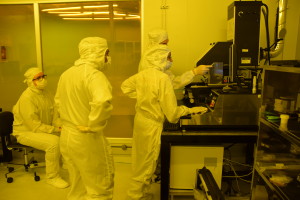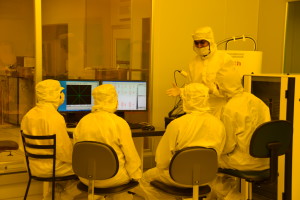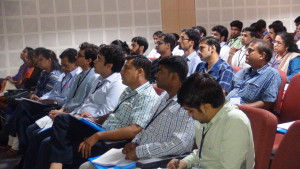The centre offers MTech and PhD degree programs in the area of nano science and engineering.
 M. Engg. in Semiconductor Technology:
M. Engg. in Semiconductor Technology:
CeNSE is launching a one-year M.Engg in Semiconductor Technology from the Academic year 2024-25 (Aug'24). The objective is to align with the India Semiconductor Mission to cater to the fast-growing semiconductor ecosystem in the country in particular and in the world in general. The semiconductor industry is vast and has its requirements not just from the core subjects but from a vast range of fields. This program is designed be attractive to students from multiple streams & backgrounds while at the same time aligning with the current industrial relevance of semiconductor technology vis-a-vis the demand for skilled workforce and cutting-edge R&D in semiconductor technology.
Along with guidance from experts in the field, the selected students benefit from Industrial interactions at CeNSE, CeNSE and cutting-edge R&D facilities.
Selection: 70% based on GATE score & CGPA >=8.0 (for students from CFTIs) + 30% based on interview
Duration: One year
Eligibility: BE / B Tech or equivalent degree in any discipline or M Sc or equivalent degree in electronics engineering, electrical engineering, mechanical engineering, materials engineering, chemical engineering, instrumentation engineering, physics, applied physics, photonics, material science, chemistry, etc.
Approximately 20 students will be admitted each year. The candidates will be shortlisted based on GATE ranking and CGPA>=8.0 (for students from CFTIs) and will be called for an interview. Students appearing for the interview are expected to have a good grasp of the fundamentals in their respective subjects. The interview process tests the subject knowledge as well as the aptitude and interest to pursue interdisciplinary course work in nano science and engineering. The final selection will be made based on the performance at the interview
For more course details click here
Joint Mtech in Semiconductor Technology:
A Joint Master’s degree between the Center for Nanoscience and Engineering, IISc and Taiwanese Universities being launched from the academic year 2024-25 (Aug'24) would enable a strong relationship between Indian academia and the semiconductor industry in Taiwan. This program enables students to access the semiconductor workplace during their Master’s program through academic/industry internships and projects. This helps India stay abreast in the cutting-edge semiconductor technology employment sector as per the India Semiconductor Mission. The collaborating Taiwanese universities include National University of Taiwan, National Chiao Tung Yang Ming University, National Tsing Hua University and National Sun Yat-Sen University.
Duration: Two years
Eligibility & Selection:
a. Same as IISc’s MTech in Semiconductor Technology when IISc is the parent institute.
b. Same as Taiwanese University’s criteria when they are the parent institute.
Aproximately 1-2 students will be admitted each year for a collaborative program with each Taiwanese university. The selected candidates will spend one year in India and the other in the Taiwan university. Refer below to the course details under the M.Tech in semiconductor technology for more info.
M. Tech. in Semiconductor Technology:
CeNSE launched its M. Tech in Semiconductor Technology from the Academic year 2023-24 (Aug'23) with optional minors in the thematic areas of Nanoelectronics, Nano-bio, Photonics, Micro-systems & Packaging, Quantum Technology (in collaboration with Indian Quantum Science Initiative) and Materials (in collaboration with Department of Materials Engineering) . The objective is to align with the India Semiconductor Mission to cater to the fast-growing semiconductor ecosystem in the country in particular and in the world in general while retaining the multi-disciplinary flavor of the erstwhile M. Tech program in Nano Science & Engineering. The program is designed be attractive to students from multiple streams & backgrounds while at the same time aligning with the current industrial relevance of semiconductor technology vis-a-vis the demand for skilled workforce and cutting-edge R&D in semiconductor technology.
Along with guidance from experts in the field, the selected students benefit from Industrial interactions at CeNSE, CeNSE and Industrial fellowships, Industrial internships and cutting-edge R&D facilities.
Selection: 70% based on GATE score & CGPA >=8.0 (for students from CFTIs) + 30% based on interview
Duration: Two years
Eligibility: BE / B Tech or equivalent degree in any discipline (with GATE paper in EC,EE,ME,IN,XE-C,MT) OR M Sc or equivalent degree in Electronics or Physics (with GATE paper in PH, IN, EC).
Approximately 20 students will be admitted each year. The candidates will be shortlisted based on GATE ranking and CGPA>=8.0 (for students from CFTIs) and will be called for an interview. Students appearing for the interview are expected to have a good grasp of the fundamentals in their respective subjects. The interview process tests the subject knowledge as well as the aptitude and interest to pursue interdisciplinary course work in nano science and engineering. The final selection will be made based on the performance at the interview.
For more course details Click here
Ph. D. Degree:

The Centre offers admission to the Ph. D. degree program of the Institute under two streams, as described below. These programs involve rigorous course work followed by thesis research in various fields, including nanomaterials and nanostructures, electronics, nanofluidics, nanophotonics, nanobiotechnology, plasmonics, sensor systems, computational modeling etc.
Duration: Variable (typically four to six years) although there have been exceptional instances where PhD thesis have been successfully defended under 2.5 years
Direct Admission (denoted as NE stream)
The NE stream provides direct admission to the Ph.D. program of the Centre run by its faculty. Research Areas: Nanomaterials and Nanostructures, Nanoelectronic Devices, Nanoscale motion, Nano-Biophotonics, Nanophotonics, Plasmonics, Sensor Systems and Computational Nanoengineering.

Interdisciplinary Program (denoted as NA stream)
The second stream is an interdisciplinary program conducted by the Centre in conjunction with several other departments across the Institute. A student admitted under this program has two advisors from two different departments. The admission into this program is offered against a specified research project proposed by the two advisors. A list of all available projects is made available to admission seekers before the interview.
Research Areas: Broadly, all areas of nano science and engineering.
Eligibility for the PhD programs:
- M.E./M.Tech. or equivalent in any discipline.
- B.E. / B.Tech. or equivalent in any Engineering discipline with a valid score in a recommended GATE paper (See list of papers for M.Tech)
- M.Sc. or equivalent in any Science discipline with a valid score in a recommended GATE paper (See list of papers for M.Tech)
- Qualification in one of the following national exams: INSPIRE, Joint CSIR UGC NET for JRF, DBT JRF, UGC NET for JRF and JEST.
